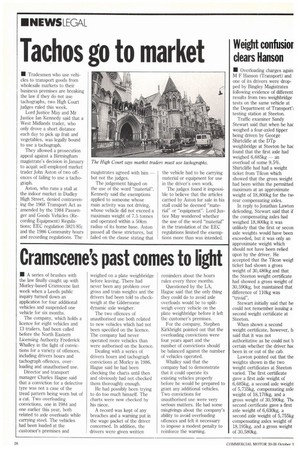Cramscene's past comes to light
Page 18

If you've noticed an error in this article please click here to report it so we can fix it.
• A series of brushes with the law finally caught up with Morley-based Cramscene last week when a Leeds public inquiry turned down an application for four additional vehicles and suspended one vehicle for six months.
The company, which holds a licence for eight vehicles and 13 trailers, had been called before the North Eastern Licensing Authority Frederick Whalley in the light of convictions for a variety of offences, including drivers hours and tachograph offences, overloading and unauthorised use.
Director and transport manager Charles Hague said that a conviction for a defective tyre was not a case of the tread pattern being worn but of a cut. Two overloading convictions, one in 1984 and one earlier this year, both related to axle overloads while carrying steel. The vehicles had been loaded at the customer's premises and weighed on a plate weighbridge before leaving. There had never been any problem over gross and train weights and the drivers had been told to checkweigh at the Gildersome dynamic axle weigher.
The two offences of unauthorised use both related to new vehicles which had not been specified on the licence. The company had never operated more vehicles than were authorised on the licence.
Dealing with a series of drivers hours and tachograph convictions at Morley in 1986, Hague said he had been checking the charts until then and obviously had not checked them thoroughly enough.
He had possibly been trying to do too much himself. The charts were now checked by his niece.
A record was kept of any breaches and a warning put in the wage packet of the driver concerned. In addition, the drivers were given written reminders about the hours rules every three months.
Questioned by the LA, Hague said that the only thing they could do to avoid axle overloads would be to splitweigh every vehicle on the plate weighbridge before it left the customer's premises.
For the company, Stephen Kirkbright pointed out that the overloading convictions were four years apart and the number of convictions should be balanced against the number of vehicles operated.
Whalley said that the company had to demonstrate that it could operate its existing vehicles properly before he would be prepared to grant any additional vehicles. Two convictions for unauthorised use were very serious matters. He had some misgivings about the company's ability to avoid overloading offences and felt it necessary to impose a modest penalty to reinforce the warning.






























































